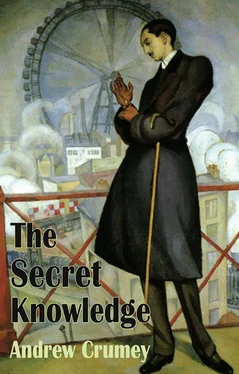“I can’t tell you, it’s too dangerous. And don’t try calling this number, it won’t work.”
“You should come back to the college.”
“Everything’s wrong, Paige. Don’t you feel it? Didn’t you notice? The needle jumped, everyone’s mind was on something else.”
This is what a nervous breakdown sounds like and it’s not Paige’s fault, has nothing to do with her, but he’s trying to make her feel involved, and that’s the trouble, she is. “People want to help you.”
“I’m in the wrong life. None of this should be happening.”
“We all have moments like that.”
“Laura’s gone.”
“I know,” she says, playing along with the fantasy. “She walked out on you.”
He shouts, “The whole fucking world walked out!”
She waits silently until he calms down and apologises. All she wants is the score. “Are you at home?”
“I can’t go back there.”
“Then tell me where you’re staying. Or perhaps we could meet.” Immediately she realises this might sound too eager, she switches instead to flattery. “I preferred your lessons to Mrs White’s. Wish I could have seen more of that Klauer work you gave me.”
“Has anyone contacted you about it?”
“No.”
At Conroy’s end Paige can hear a sound she equates with thought, something like an indecisive sigh and the rubbing of his chin, while around her there’s birdsong from empty gardens, an occasional passing car. Eventually he says, “We can’t meet, it would be too much of a risk. The last thing I’d ever want would be for you to come to any harm.”
“You wanted to perform the Klauer.”
“It’ll never happen”
“Then it’s lost again?”
Another silence, she’s sure he suspects nothing. Right now, Paige feels real pity for this weak man who’s become fixated on her for no reason and is entirely the maker of his own misfortune. It’s not her duty to feel sorry: she owes him nothing.
“Send it to me,” she says, breaking into his hesitation.
“The score? But surely…”
“Mail it to me at the college. Nobody will know I have it. A perfect way to keep it safe. I really want to help you.”
She hears him struggling to find words. “Paige…”
“Just send it.”
“Guard it carefully. Tell no one. I know I can trust you.”
Asja has gone into a shop to buy almonds but doesn’t know the Italian word; a German gentleman helps her with the translation. Small round glasses; thick, dark hair; intellectual, from a well-to-do background. And clumsy. He insists on helping her with the packages but drops them, accompanying her to the place where she’s staying. His name is Walter Benjamin. He’s been here in Capri for some time, would she mind if he were to call on her? Next day Asja cooks spaghetti; he explains he’s noticed her already some time before, walking across the piazza. This is not how he falls in love with her. This is how he announces the existence of a theoretical notion willing to be made real. Love is the translation of concept into action.
Benjamin has come to Capri to work on his habilitation thesis which will qualify him to teach in a university. He is to remain here for six months while his estranged wife and their young son stay in Frankfurt. Asja Lacis is a dark-eyed Latvian actress and theatre director who lives in Russia and has been a Bolshevik since before the Revolution seven years ago. She is staying on Capri with her partner and daughter. Benjamin tells her his thesis is on Trauerspiel , a style of Baroque drama characterised by violence and suffering. She asks him why anyone should waste time studying old plays that nobody reads.
The connection between a battleship and the many workers who hammered its rivets is like that of worshippers in regard to the idols of organised religion; the fetish-character of commodities leads to their being seen as phantoms whose assumed reality supersedes that of the people who made them. Thus our existence within capitalism is a condition of dreaming. Asja awakens him to this. He writes to friends about the interesting communist he has met, and with whom he is having long discussions. He sends postcards to his wife, telling her he is fine. Their relationship was extinguished some time ago; he feels closeness only towards his son, because Benjamin has not forgotten how to see the world with a child’s eye of fear and wonder. He agrees with Baudelaire, childhood is the state closest to original sin, therefore purest. In the streets and brothels of Paris, Baudelaire stirred himself from dogmatic slumber, saw through the illusion, appreciated that modern life is an allegory whose signs can mean anything. Possessions, money, family, home: skeletons of their own contradiction.
Love begins with the contemplation of beauty, yet contemplation is a situation produced by capitalist production. Love itself is therefore allegorical: Asja could be anybody, she is the shape of the particular emptiness Walter brought with him to this Italian island, and it is the exactness of fit that bewitches him, the stencil of an unfulfilled desire waiting only to attach itself to a name. Asja: again and again he inscribes it, admiring the concordance between sound and image. I love you, he writes secretly to himself. I want to be with you, I want to leave my wife and child and live only with you. I want to be living the past that we will jointly remember, reading these words that will have become historical fact.
Capitalism is a mass narcosis whose ur-myth is the false promise: you can be happy. But love is this same dream, an internalised mythology, and Asja laughs at him: I am not a muse of the bourgeoisie, I am a proletarian and a free woman. I am not an unpaid prostitute who will be told whom I may or may not sleep with; I satisfy my physical needs and desires as I see fit. Free your own mind and heart, Walter, if your marriage is unhappy then get out of it.
— But what about our son?
He needs real love, not the illusion of an outmoded institution.
— How am I to find happiness?
Only through revolutionary action.
It is the Copernican turn of his heart; he came here to finish his thesis on Baroque drama but already he is thinking of another project: a book of fragments, epigrammatic or even surreal in character, apparent irrelevancies serving to create new, unintended meaning. And though he will go to Moscow, the centre of his thought will be Paris, the covered arcades where Baudelaire realised he was strolling in Hell.
Asja, I love you, he writes. I want to be able to look at your face every day; see how, like a mountain beside a lake, it changes with every passing cloud, every fluctuation of pressure and temperature. I want to see your breasts, kiss your belly and that catacomb, place of skulls, your lap where a new dream breaks all fetters and submerges us. I want to be human with you, mortal, slowly ruined by time until we are both dust together. I have never known this certainty of disaster.
— Walter, you are delightful and I so much enjoy being with you. I can think of no more stimulating companion, with your astute mental faculties, your understanding of philosophy. But you’re clumsy, and things will fall.
1. By all means discuss the book you are writing, but do not disclose its essence, any more than you would tell a child how a magic trick is done.
2. Make note of everything. For example, the conversation with the unusual Frenchman.
Читать дальше











